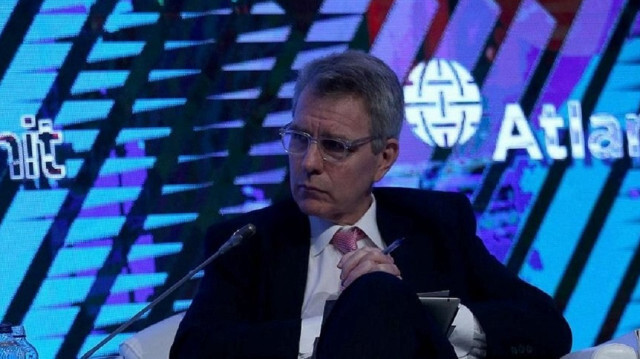
Assistant Secretary Geoffrey Pyatt underscores Türkiye's role in supporting southeastern Europe's energy security, clean energy, regional supply diversification
US Assistant Secretary for Energy Resources Geoffrey Pyatt emphasized Türkiye's crucial role as a central energy hub for southeastern Europe, contributing to regional energy security and diversification.
“We talked about our cooperation on energy security, the role that Türkiye is playing as a key energy hub for southeastern Europe, helping to build diversity and security in regional energy supplies and reduce Russia's ability to use its energy for coercion,” Pyatt told Anadolu following his visit to Istanbul last week.
He attended the Atlantic Council's regional conference on clean and secure energy, alongside Turkish Energy and Natural Resources Minister Alparslan Bayraktar, Deputy Foreign Minister Berris Ekinci and high-level participants.
Pyatt highlighted the broad scope of US-Türkiye cooperation, particularly in critical minerals.
"With Deputy Minister Ekinci, we talked about a huge agenda of US-Türkiye cooperation, including our ambitious vision for working together on critical minerals in the context of Turkey's participation in the MSP forum in New York last month,” he said.
Türkiye recently joined the Minerals Security Partnership (MSP) forum, collaborating with the US, EU and international partners on the production of essential raw materials and rare earth elements.
- Expanding clean energy and wind power
In a broader discussion about energy transition, Pyatt noted the progress in Türkiye's clean energy efforts.
“It was exciting for me flying into Istanbul to see all the new wind power construction. Our Development Finance Corporation has just approved a large new loan for the further expansion of onshore wind capacity in Türkiye,” he said, underscoring the importance of diversifying energy sources and accelerating clean energy projects.
- Southern Gas Corridor
Touching on the Southern Gas Corridor, Pyatt reflected on the long history of US-Türkiye cooperation in building the corridor, including his work as a former ambassador to Greece.
“The Southern Gas Corridor is operating today, a successful venture involving cooperation between Azerbaijan, Türkiye, Greece, Italy -- has played a critical role in terms of helping to build energy diversification, especially in southern Europe, in Italy, in the Balkans,” he said.
There is also the prospect of future expansion, including the vision of a vertical gas corridor that could transport gas from southeastern Europe to Bulgaria and Romania, according to Pyatt.
- US-Türkiye energy cooperation
Noting that Türkiye has significantly expanded its national regasification capacity, Pyatt said the US is “very excited” about long-term agreements that Türkiye recently reached with Shell in the UK and TotalEnergies in France.
“Hopefully, a lot of that gas will be coming from the United States, from the Gulf Coast,” he added.
In May, Ankara also signed a separate 10-year agreement with Exxon Mobil in the US to receive 2.5 million tonnes (2.7 tons) of LNG annually.
- Nuclear energy cooperation
On the potential for US-Türkiye partnerships in nuclear energy technology, particularly in small modular reactors (SMRs), Pyatt emphasized the advantages of US nuclear technology over Russia's role in Türkiye's current projects, such as Akkuyu.
“I was joined in Istanbul by the chair of our Export-Import bank, my friend Reta Jo Lewis. Reta Joe talked about the readiness of Exim (Export-Import Bank of the US) to support our nuclear technology exporters, including in Türkiye,” he said.
“We would like to see American civil nuclear companies, both traditional reactors, big, large-scale reactors, but also the emerging SMR sector, develop partnerships with Türkiye, and not just to deploy their systems in Türkiye, but also to be development partners,” he said, adding that the SMR model is designed to allow much faster development and rollout.
During his visit to Washington in May, Turkish Energy Minister Bayraktar said SMRs have an important place in Türkiye's long-term energy plans and urged American companies to collaborate on the technology.
- Iraqi-Türkiye pipeline
Addressing the suspended Iraq-Türkiye oil pipeline, Pyatt emphasized the strong convergence between Washington and Ankara on the need to restore operations.
“The United States wants to get the pipeline operating again. Ankara wants to get the pipeline operating again. I was reassured that also at the Atlantic Council conference, the KRG oil minister similarly underlined the desire in Erbil to get the pipeline operating again,” said Pyatt.
“It's a missed opportunity for Baghdad. It's a missed opportunity for Erbil, and it only plays to the advantage of the smugglers who are sending oil from KRG into Iran and Iraq's adversaries in Tehran,” he added.
Noting a meeting Wednesday between Turkish President Recep Tayyip Erdogan and Nechirvan Barzani, president of Iraq's Kurdistan Regional Government (KRG), in Ankara, he said the US hopes there will be progress in the immediate future.
In March of last year, Iraq stopped crude exports from the northern Kirkuk fields in the KRG after winning an arbitration case against Türkiye.

